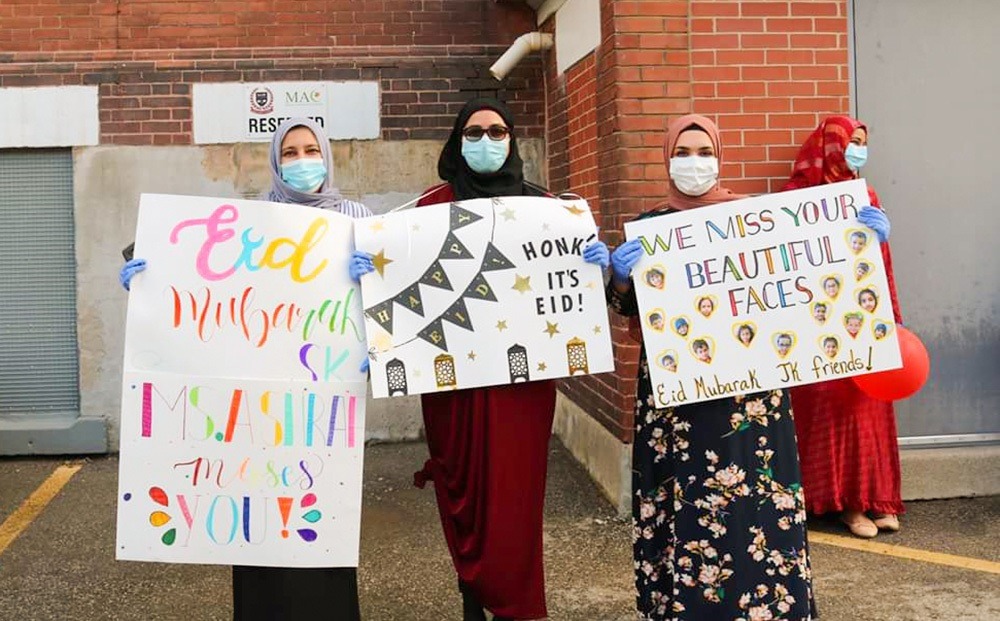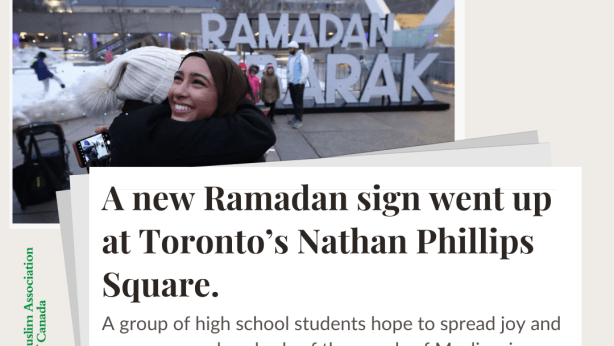People Are Home. ‘Let’s Bring Eid to Them!’

People Are Home. ‘Let’s Bring Eid to Them!’
Muslims will observe two holy rituals in pandemic times, and they’re adapting to protect their communities.
Mashal Butt 29 Jul 2020 | TheTyee.ca

“I will be on Skype, Zoom, WhatsApp video, and whatever else is out there to talk to my family and friends,” said Reyhana Patel about her plans for Eid this year.
Eid-al-Adha is the second of the Islamic rituals celebrated by Muslims around the world. The celebration this year falls on July 31, lasting for four days.
The ritual commemorates the Prophet Ibrahim’s willingness to sacrifice his son in devotion to God. Before the sacrifice is carried out, God replaces the son with a lamb. To honour this, Muslims sacrifice an animal (lamb or goat, for example) and distribute the meat among the community members, especially the most vulnerable. It’s a celebration of the message of sacrifice, devotion and equality.
But the COVID-19 restrictions on large gatherings mean that Eid will look different this year.
Hajj — the pilgrimage to Mecca that culminates into Eid-al-Adha — has been barred for Muslims residing outside of Saudi Arabia to stop the spread of COVID-19. Only a few thousand locals will be performing Hajj this year, instead of the usual millions.
And many other customs will need to be adapted: the donning of colourful, flowing gowns for women and tunics with loose-fitted trousers called sirwal for men; the offering of traditional Eid prayers in the morning; and the giving of charity, meeting of family and friends, and hosting of big feasts that occur throughout the rest of the day.
“Even though we know what to expect now, we are still disappointed,” said Patel, head of external relations for the charity Islamic Relief Canada. The pandemic has pushed Patel’s organization to be more creative with its activities this year.
“We’ve been amending things that we do to make it more pandemic friendly,” said Patel with a breathy laugh, as she talked about the move to online community dinners and lectures. The organization is running a virtual toy drive this Eid for youth and families across Canada, including Vancouver.
This isn’t new territory for the Muslim community. Just two months ago Muslims celebrated Eid-al-Fitr to commemorate the end of Ramadan — which includes a month-long fast — in the midst of the pandemic. The stricter physical distancing protocols pushed many to move Eid to a virtual space to try to retain a sense of community among people.
“This was one of our first opportunities to creatively deliver Eid,” said Memona Hossain, a board director of the Muslim Association of Canada. “We thought OK, people are home. Let’s bring Eid to them!”
The non-profit ran a broadcast program shared coast-to-coast featuring live Eid speeches, children’s shows, family interactive games and evening entertainment segments. And it is looking to provide similar support to the community this time around.
Ibrahim Al-iadah, co-ordinator for MAC’s Vancouver chapter, has already made plans to ensure the community can practise faith safely and responsibly during the pandemic. Usually, hundreds and thousands of Muslims line up shoulder-to-shoulder to offer the morning Eid prayer. But B.C. government restrictions ban gatherings of more than 50 people.
As a result, the non-profit will offer three Eid prayers instead of one to accommodate as many people as possible. People need to register to attend the morning Eid prayer and are expected to bring their own prayer mats and pray on marked spaces to ensure appropriate physical distancing.
“A lot of people were shocked to find out that when we pray, we pray actually about two or three metres away from each other. That we are following the required protocols,” said Al-iadah of the public’s misconception of seeing faith as an age-old thing. “We’re living in a pandemic. And we are doing what’s needed to be done.” People can register for Eid prayers on the non-profit’s website.
Al-iadah also hopes that doing a candy-drive and distributing goodie bags to kids this Eid will help bring them joy. Eid is normally a joyous time for kids, like attending multiple birthday parties in a single day. But the pandemic has halted such gatherings.
“With the pandemic happening, you want to make it up for the kids. [Giving candy] may seem like a small thing for us, but the kids will always remember this,” said Al-iadah. “It’s not about us, it’s about them and for them to remember that the joy of Eid will always be present, even during a pandemic.”
Eid-al-Adha is also called the “Festival of Sacrifice,” commemorating the willingness of Prophet Ibrahim to sacrifice his son to honour God’s decree. Al-iadah believes that this year’s celebrations during the pandemic ties in with the self-sacrificing spirit associated with Eid.
“You see family and friends and members of the community that you want to shake hands with, that you want to hug,” said Al-iadah. “This Eid we are going to have to sacrifice that for the greater good.”
After the recent uptick in cases in B.C., Aisha Azba Amijee, executive director at a Vancouver based non-profit Voices of Muslim Women, agrees that respecting health protocols is primary.
“It is OK to sacrifice the way we usually do things for the safety and well-being of the entire community,” said Azba Amijee. “Right now, being safe is more important.”
Azba Amijee, who is in the middle of a move to Victoria, said that the pandemic has allowed the community to find new ways to celebrate its Muslim identity. “Sometimes, people find it difficult to connect with traditions that they grew up with because those traditions are often too disconnected from their own personal culture and tradition. So, they either discard them, or it becomes forgotten.”
She believes that the community can adapt to the times and create traditions that better reflect and echo the culture we live in now. “New traditions can still carry those same themes of authentic enthusiasm and excitement.”
A combination of old traditions such as dressing up and making a family feast with the new traditions of hashtags, selfies, video-calling loved ones, and attending online Eid celebrations is what can make this Eid stand out for all the right reasons, said Azba Amijee.
“This is what Eid 2020 will be for our family, and we shouldn’t be afraid to find new ways to celebrate each other.
“And clothes!” added Azba Amijee playfully. “Dressing up and food is very important. Everything else can change.”
Original article found here.


